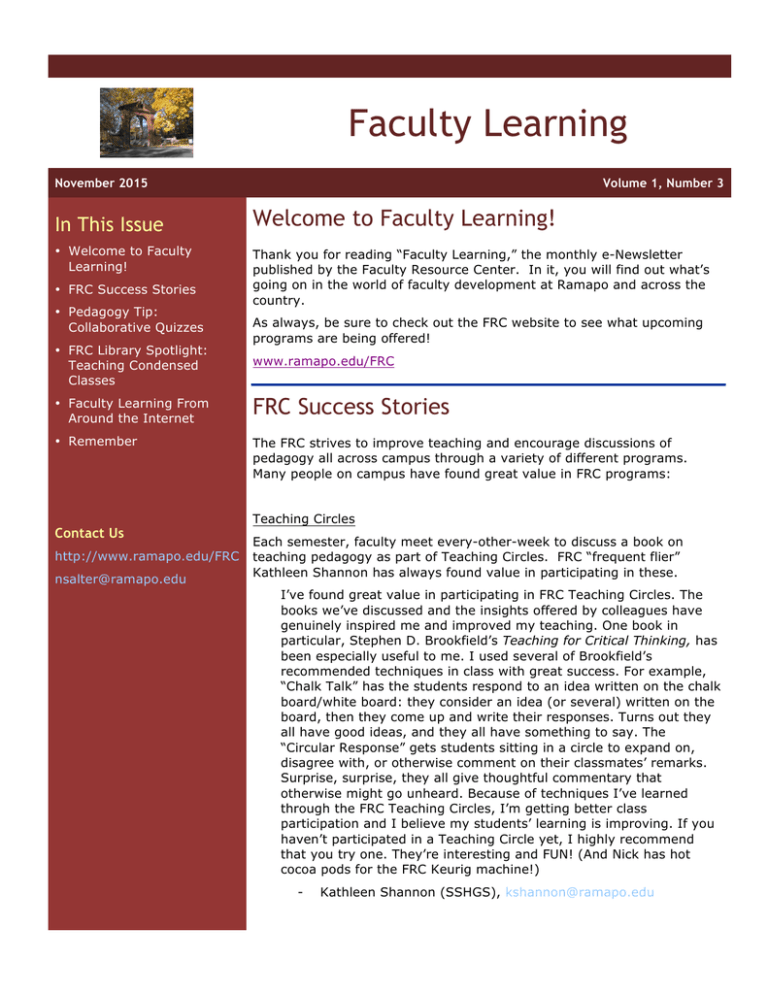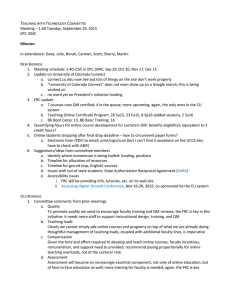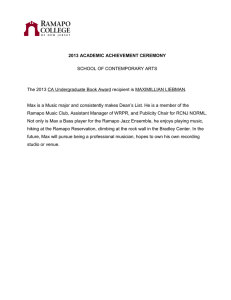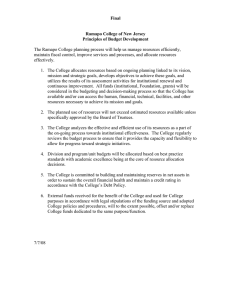Faculty Learning Welcome to Faculty Learning! In This Issue
advertisement

Faculty Learning November 2015 In This Issue • Welcome to Faculty Learning! • FRC Success Stories • Pedagogy Tip: Collaborative Quizzes • FRC Library Spotlight: Teaching Condensed Classes Volume 1, Number 3 Welcome to Faculty Learning! Thank you for reading “Faculty Learning,” the monthly e-Newsletter published by the Faculty Resource Center. In it, you will find out what’s going on in the world of faculty development at Ramapo and across the country. As always, be sure to check out the FRC website to see what upcoming programs are being offered! www.ramapo.edu/FRC • Faculty Learning From Around the Internet FRC Success Stories • Remember The FRC strives to improve teaching and encourage discussions of pedagogy all across campus through a variety of different programs. Many people on campus have found great value in FRC programs: Contact Us http://www.ramapo.edu/FRC nsalter@ramapo.edu Teaching Circles Each semester, faculty meet every-other-week to discuss a book on teaching pedagogy as part of Teaching Circles. FRC “frequent flier” Kathleen Shannon has always found value in participating in these. I’ve found great value in participating in FRC Teaching Circles. The books we’ve discussed and the insights offered by colleagues have genuinely inspired me and improved my teaching. One book in particular, Stephen D. Brookfield’s Teaching for Critical Thinking, has been especially useful to me. I used several of Brookfield’s recommended techniques in class with great success. For example, “Chalk Talk” has the students respond to an idea written on the chalk board/white board: they consider an idea (or several) written on the board, then they come up and write their responses. Turns out they all have good ideas, and they all have something to say. The “Circular Response” gets students sitting in a circle to expand on, disagree with, or otherwise comment on their classmates’ remarks. Surprise, surprise, they all give thoughtful commentary that otherwise might go unheard. Because of techniques I’ve learned through the FRC Teaching Circles, I’m getting better class participation and I believe my students’ learning is improving. If you haven’t participated in a Teaching Circle yet, I highly recommend that you try one. They’re interesting and FUN! (And Nick has hot cocoa pods for the FRC Keurig machine!) - Kathleen Shannon (SSHGS), kshannon@ramapo.edu Professor Swap This semester, the Professor Swap program paired up faculty from different disciplines to come into each other’s classes and teach one session. As part of this program, Ashwani Vasishth of Environmental Studies and Neriko Doerr of Cultural Anthropology worked together. Ashwani Vasishth (SSHS) visited my class on October 1, 2015. We had three readings assigned by him, and he began his class by asking each student what they learned so far in my class, their view of the assigned readings, and any burning questions they might have. The dialogue between the students and he became the main content of the class. This Professor Swap worked well at various levels. At the level of the structure of authority, it was a nice relinquishing-control moment for me, which probably my students enjoyed. Though I often have guest speakers in my class, it was a very different experience from that because it was more open-ended than the guest speakers I chose to invite to cover very specific topics. At the level of content, Ashwani provided us with different angles from which to discuss similar issues. E.g., my class is about indigenous peoples around the world, and he gave us a different angle on colonialism. He talked about “othering” in colonial processes, which we had not talked about at the time. Students identified the concept with Ashwani and that helped it stick. When we got to the part of class that focused on “othering” processes—museum displays and objectification of the researched— students would say “Like Prof. Vasishth was saying…” At the personal level, it was fun for me to work with another professor and was a good occasion to get to know more about him and his work. I’m looking forward to doing this again in the future. - Neriko Doerr (SSHGS), ndoerr@ramapo.edu Convening Group Pedagogy Focus At a recent meeting of all conveners across campus, the FRC and IDC Directors invited all conveners to schedule five minutes in one or more convening group meeting for discussions of pedagogy. On November 11, 2015, many convening groups (including the Literature convening group) tried this out. The Literature convening group took the five minutes to discuss the usefulness of daily/regular reading quizzes. The discussion brought up all sorts of questions: • What is the best way to create a culture of trust and collaboration among students and between students and faculty? • How to craft these exercises so they are not perceived as punitive? • How can we make quizzes less onerous to students and less burdensome for faculty? The discussion was spirited and useful. Capping it at 5 minutes (closer to 10) was also useful, as it kept us on task. - Ed Shannon (SSHGS), eshannon@ramapo.edu Pedagogy Tip: Collaborative Quizzes This Pedagogy Tip is brought to you by Susan Petro, Biology Instructor (TAS), spetro@ramapo.edu. Based on the principles outlined in the book Learner-Centered Teaching (by Maryellen Weimer), she has begun incorporating collaborative quizzes into her classes: The students take their usual 10-minute weekly quiz individually. As soon as the quizzes are collected the students gather into groups of 4-5 based on the rows in which they are sitting, front to back of the classroom. I chose this method of grouping as it tends to result in more diverse groups than just letting them choose their friends. The students then take the same quiz as a group and are free to discuss why they answered as they did. The first time I tried this I was amazed at the lively interchanges that ensued in the next ten minutes. The students told me they learned much more from each other than they did by just reviewing their individual graded quizzes. They were forced to clarify their thinking as they tried to convince their group why theirs was the correct choice. Other students said it was beneficial to watch others model how they went about determining what the question was asking, eliminating wrong answers, etc. As to grading, I average the individual grades for each group, subtract this average from the grade of the group quiz and divide the difference by two. I then add that value to their individual grades. So if the group quiz grade was 90 and the average of the individual grades was 80 I would add 5 points to each student’s grade. For more information about this technique, check out the book: Learner-Centered Teaching (by Maryellen Weimer) http://www.amazon.com/Learner-Centered-Teaching-FiveChanges-Practice/dp/1118119282 If you have a Pedagogy Tip you think others would benefit from, please contact the FRC Director Nick Salter nsalter@ramapo.edu – you could be in an upcoming issue of Faculty Learning! FRC Library Spotlight: Teaching Condensed Classes If have taught Summer or Winter courses, then you know that teaching in a condensed timeframe (5 weeks for Summer courses and 3.5 weeks for Winter courses) can be challenging. How do you condense the course material into this timeframe? What content will you keep and what content will you remove? How will you change your teaching style – how will your pedagogy be different? These questions are especially relevant if you are teaching a Summer or Winter class for the first time. Check out this book from the FRC library: • Teaching Intensive and Accelerated Courses (by Raymond J. Wlodkowski and Margery B. Ginsberg) http://www.amazon.com/Teaching-Intensive-Accelerated-CoursesInstruction/dp/0787968935 Anyone is welcome to borrow a book from the library – stop by sometime! Also: we take requests! The FRC is happy to purchase any books for the library that you think would be useful to the Ramapo community. The FRC library also has many other books on all sorts of topics related to pedagogy, learning, and academia – come check it out! Faculty Learning From Around the Internet Should We All be Grading Blind? (from The Chronicle of Higher Education) Do faculty let their subconscious biases (positive and negative) about students impact their grading? The research on this question is mixed. But if all grading is done blind, what will we be missing out on – do we lose the opportunity to give early feedback to students? In this post, the author discusses the pros and cons of blind grading. https://chroniclevitae.com/news/1186-should-we-all-be-gradingblind? Seasonal Retail and Final Exams (from the Inside Higher Ed Blog) We may not realize it, but finals week in the Fall semester can be an especially difficult for lower-income students. This is the time that many lower-income students must work longer hours at retail jobs due to the holidays . . . but they must also study longer hours for their finals. In this post, implications of this are discussed. https://www.insidehighered.com/blogs/confessions-communitycollege-dean/seasonal-retail-and-final-exams A New Twist on End-of-Semester Teaching Evaluations (from the Faculty Focus Teaching Professor Blog) As faculty, we often bemoan end-of-semester evaluations – not because we don’t want feedback, but because we don't think the evaluations we use are the best method of measuring how the students feel. This post discusses methods of improving evaluation forms and ideas you could try yourself. http://www.facultyfocus.com/articles/philosophy-of-teaching/a-newtwist-on-end-of-semester-evaluations/ Remember As always, keep in mind that the FRC is here to help you. If you have any questions, comments, or concerns, please do not hesitate to reach out to the Director, Nick Salter, nsalter@ramapo.edu




